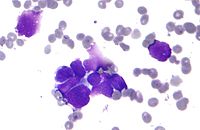
Photo from wikipedia
Development of tyrosine kinase inhibitors (TKIs) against oncogenic drivers has significantly improved survival of patients with oncogene-mutated non-small cell lung cancer (NSCLC). However, acquired resistance to TKIs emerges over time… Click to show full abstract
Development of tyrosine kinase inhibitors (TKIs) against oncogenic drivers has significantly improved survival of patients with oncogene-mutated non-small cell lung cancer (NSCLC). However, acquired resistance to TKIs emerges over time in essentially all patients who initially respond. Recent evidence suggests that drug-tolerant persister (DTP) cells, which survive and adapt to targeted therapies during an early phase of treatment, play an important role in the emergence of drug resistance. We previously reported that CD74 expression is upregulated in EGFR-mutated lung cancer after treatment with EGFR-TKIs and that CD74 can be one of the DTP cell markers. However, the mechanism underlying CD74 expression and the role of CD74 in DTP cells remain unclear. Here, we sought to identify the mechanism using cell culture systems and transgenic mouse models. We confirmed that CD74 upregulation at the mRNA level after TKIs treatments in various oncogene-mutated cell lines, including those with EGFR mutations, ROS1 fusions, and ALK fusions. We found that CIITA, upstream of CD74, and TNF-α expression were induced by TKIs treatments in tumor cells, leading to an increase in CD74 expression. In addition, we found that TKIs treatments enhanced the autocrine secretion of macrophage migration inhibitory factor (MIF), a ligand of CD74, from tumor cells, suggesting that autocrine stimulation of the CD74 signaling results in block of apoptosis and emergence of DTP cells. To examine whether CD74 plays an important role in the emergence of resistance to TKIs in vivo, we crossed lung-specific EGFR-L858R-T790M transgenic mice with Cd74 knockout mice. Complete deletion of CD74 overcame or delayed resistance to TKIs. Taken together, the MIF-CD74 axis can be a novel target to overcome resistance in driver-mutated NSCLC. Citation Format: Motohiro Izumi, Meghan Lee, Daisuke Shibahara, Ikei S. Kobayashi, David Plotnick, Susumu S. Kobayashi. Targeting the MIF-CD74 axis to overcome resistance to tyrosine kinase inhibitors in non-small cell lung cancer [abstract]. In: Proceedings of the American Association for Cancer Research Annual Meeting 2023; Part 1 (Regular and Invited Abstracts); 2023 Apr 14-19; Orlando, FL. Philadelphia (PA): AACR; Cancer Res 2023;83(7_Suppl):Abstract nr 3460.
Journal Title: Cancer Research
Year Published: 2023
Link to full text (if available)
Share on Social Media: Sign Up to like & get
recommendations!